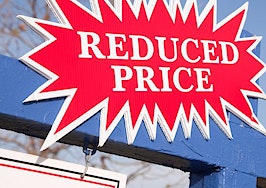- Agents put fake prices on homes to drive interest because they know the prices will go much higher. It’s good for their personal stats and next listing appointment, but it erodes industry credibility.
Recently widowed and suddenly alone, a woman was referred to me by her son. She was hoping to move into the San Francisco Bay Area to get back to her roots and be close to her remaining family.
Her budget was tight for the area she desired, and her initial offers were beat out by higher multiple offers. We found a home that had been on the market approximately 30 days, which was very unusual for that neighborhood. As we discovered, it had foundation issues, which scared away other potential buyers.
Undeterred, my client asked me to write an offer at the asking price. I did, and was shocked to receive an “as-is” counter offer $100,000 over list price.
After querying the listing agent, I was told, “The list price is just a number designed to get attention.” She continued, “The seller will not accept anything under $100,000 over list price.”
We countered with a higher offer at the buyer’s pre-approved ceiling, but it still was not enough for the seller. Because this was the lowest priced home in the area, my buyer was effectively priced out, and she gave up.
Just a number?
It turns out that setting a random, but low, listing price is a very common practice in our area. Agents in other parts of the country might wonder how someone might get away with this; it’s because our exceptionally low inventory and unparalleled high demand produce multiple offers and overbidding.
Agents put fake prices on homes because they know the prices will go much higher.
As an example, I recently prepared to craft an offer on a townhouse priced at $699,000. Running the comps, I discovered that the most recent comparable sale was at $834,000.
I pinged the listing agent about the fake listing price and was told, “It is the pricing strategy used frequently by sellers and their agents in this area.” I wrote an offer on his listing at $840,000 and was told that, of the 13 offers that came in, I was offer no. 4.
Although I understood what the listing agent was saying, I have to ask, “why?”
Call me old-fashioned, but I believe a seller should be willing to sell the property at the list price.
In other words, buyers should be able to purchase a home for the list price or even lower if they are the only offer.
You don’t go into a store, look at a price tag and take the goods to the counter only to be told, “That’s not the real price.”
In fact, if anything, it works the exact opposite. I have taken items such as antiques to the clerk and managed to bargain the price down.
Why do listing agents lowball the home price?
As a result of watching a number of local listing agents, I have developed a few conclusions:
Agents want their list-to-sale ratio to be as high as possible.
Think about the agent who can say, “My average sales price is $150,000 over list price.” Or the one who can brag about only a handful of days on the market. Although that might sound wonderful during a listing presentation, there is a problem. Just like the fake list price, the list-sale ratio is also fake. It’s contrived, as in, dishonest.
Agents want to get as many buyers through their listings as possible.
A significant number of buyers have absolutely no hope of purchasing the property, but it is seemingly the number of visitors that count, or web hits for some. Again, the numbers look great in a listing presentation, but once more, they give a completely false representation of reality. Still dishonest.
Agents want to get as many offers as possible.
Even though a bogus list price is recognized as fake by many buyers, there are always some out there who want to believe the price is real. I call it misplaced optimism, and it is real.
Others look at the last comp and know they cannot go quite that high, but think they may still have a chance. The net result is a ton of offers flood in, adding to the “bragging rights” for the listing agent in, wait for it — their next listing appointment.
It’s a waste of resources for the potential buyers and their agent’s time and resources, all to write an offer close to list price that had about as much of a chance as a snowball orbiting the sun.
And it’s not just buyers who get sucked into this trap — sometimes unseasoned agents who fail to exercise due diligence make the same mistake. Listing agents who utilize this tactic say that’s how the game is played.
Agents want to increase the pool of potential buyers.
Agents reason that if a buyer, preapproved for a much lower amount, visits the property because of the fake price and consequently falls in love, they will figure some way to come up with more money to submit a meaningful offer.
Although it’s true that some buyers can come up a bit, most in this area are already stretched to the breaking point to get in. Even if they could get a higher loan, it would skew their loan-to-down payment ratio and make their offer less appealing.
Additionally, do not we have a fiduciary responsibility to coach our buyers to stay within the boundaries of reason, or does closing a deal mean more?
It’s this mentality that set up the market crash a brief few years ago.
Agents want to produce an auction-like atmosphere.
I have actually heard agents say, “It’s like an auction.” I say not at all.
In an auction, everyone is notified that it is, indeed, an auction. You publish a low price with the understanding that bidders will compete, thereby driving the price up.
You are told if there is a reserve. In most cases, bidders are aware of the other offer amounts.
If an auction item gets low bids, and there is no reserve, the items sells for the highest bid. It makes no difference that the seller may have wanted more. If there is a reserve and bids fail to reach the targeted minimum price, then the item is not sold and is consequently taken off the market.
Further, auctions are in a category of their own and most MLSs govern them with their own specific set of rules.
Why this tactic is problematic
In my opinion, while this practice may not technically violate any rules, I believe it is deceptive, and I know a number of buyers who agree. Here are a few problems with this technique:
It removes the need for a listing agent to do the job.
If a fake price is OK, then sellers can throw any price out there. It takes no time, talent or effort. Just copy the fake list price from the last listing.
It misrepresents the seller’s real intentions.
If a seller truly wants more, then they should state that fact up front. Why mess with gimmicks and games? Put the number out there the seller really wants, and let the market do its magic.
If no offers come in, then the price is too high. If two or three offers come in and push the price higher, then once again the market has done its job.
In my opinion, if a seller sets a list price and then rejects a full-price offer when there are no higher offers, they should either change the price to the one they actually want or remove the home from the MLS.
It erodes consumer confidence in Realtors and the real estate industry.
This practice not only brings into question a Realtor’s ethics, but it also angers buyers who feel like they have been hit with a bait-and-switch. The irony here is that it’s possible to sell a large number of homes using realistic list prices.
I know because we do it.
Every list price we put on the MLS is a price the seller is willing to accept. Sure, they might like more, but at the end of the day, their list price is acceptable.
Instead of 20 offers that are all over the map, we get a few good ones. Truthfully, all we really need is one great offer. Interestingly, we constantly set records for the highest price in the neighborhoods in which we list.
As for my buyer?
After making a few comments about the lack of integrity in the real estate community, she headed south and bought a home out of the area. She lost any hope of getting closer to her family, I lost a client, and truth be told, in her eyes, I lost credibility as well.
My recommendation? Do not rely on gimmicks to sell a home — do your job. Earn your commission. No smoke. No mirrors. No fake prices. Integrity and real estate.
Carl Medford is the CEO of The Medford Team. Follow him on Twitter.







